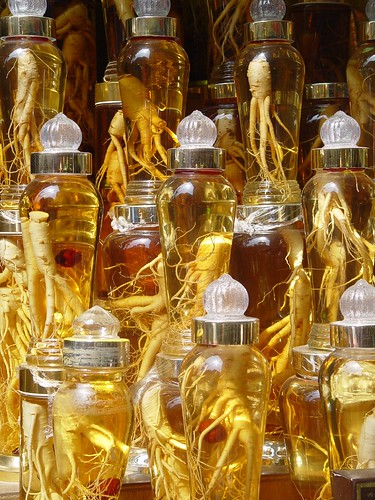
-----------------------------------------------
Magnifico articulo sobre la mejora del estado de enfermos de cáncer con el uso del ginseng chino
Traducción al español (pulsar) :
-----------------------------------------------
Ginseng tied to better breast cancer survival
Women who use the herb ginseng may be more likely to survive breast cancer, and have a better quality of life after treatment, new study findings suggest.
The study cannot establish whether ginseng is the reason for the better prognosis. But investigators say the results lay the groundwork for future clinical trials to see if there is a cause-and-effect benefit.
The study, published in the American Journal of Epidemiology, included 1,455 Chinese women who were treated for breast cancer and then followed for up to 6 years. It found that women who had been using ginseng before their diagnosis were 30 percent less likely to die during follow-up than women who had never used the herb.
In addition, breast cancer survivors who had started using ginseng after their diagnosis reported greater emotional well-being and a more active social life than those who never tried the herb.
Based on these findings, future clinical trials should investigate the use of ginseng along with conventional breast cancer treatment, according to study co-author Dr. Xiao-Ou Shu of Vanderbilt University in Nashville , Tennessee.
But for now, she told Reuters Health, women with the disease should speak with their doctors before using the herb on their own.
Like any drug, herbs can have side effects or interact with other medications - a particular concern for people receiving cancer drugs.
Ginseng is a popular herbal supplement that has long been used in traditional Chinese medicine. In the West, it is mainly touted as a way to boost energy and immune system defenses; the various commercial preparations are generally made from the roots of one of several plant species, including Panax ginseng -- also called Asian ginseng -- and Panax quinquefolius, better known as American ginseng.
Most ginseng users in the current study took an American ginseng product or unprocessed "white" ginseng root; all also received mainstream cancer therapy -- surgery, chemotherapy or radiation.
Overall, 27 percent of the women were regular ginseng users before their cancer diagnosis, and they were 30 percent less likely to die of the disease compared with non-users, with factors like age, education and stage of the cancer taken into account.
Of the 1,065 women who were still alive at the follow-up assessment, 63 percent said they had used ginseng after being diagnosed. These women reported better emotional and "social" well-being than their peers who had never used the herb.
As mentioned, it's not clear that the ginseng was responsible for these benefits, according to Shu and her colleagues. For one, many women tried multiple forms of traditional Chinese or alternative medicine, and it's not possible to separate their effects.
But, the researchers note, the findings are in line with lab research that has found that constituents of ginseng can inhibit tumor cell growth.
One question for future studies, they say, is whether the form of the ginseng is important. In China, the root is usually cut up to make tea or soup, or sliced and cooked with food.
American Journal of Epidemiology, April 1, 2006.

Newsletter Semanal :: Oncología





No hay comentarios:
Publicar un comentario